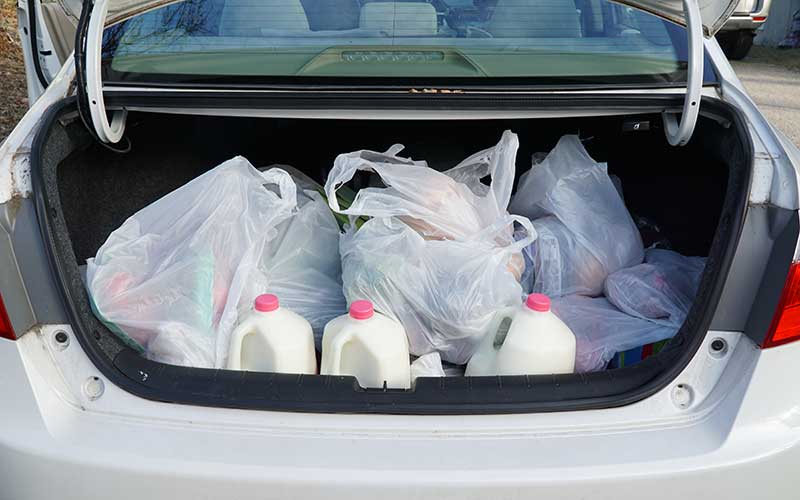
Single-use plastic bags could soon be banned statewide in Rhode Island. Photo: ND700 via Shutterstock
Rhode Island Governor Gina Raimondo’s Task Force to Tackle Plastics wrapped up on Valentine’s Day with a final report containing recommendations to the Governor. While Conservation Law Foundation did not love the process, the Task Force did bring together a wide array of perspectives, and we’re cautiously optimistic it may lead to a state-wide ban of single-use plastic bags.
Plastics Pollute Every Step of The Way
Plastics pollute our communities and environment at every stage of their manufacture and use. Plastics are made from petroleum, and cheap fracked gas in the U.S. has spurred an increase in their production. Eight million metric tons of plastic are dumped or swept into our oceans each year, killing sea life, filling beaches, and breaking down into hazardous microplastics. If we don’t change our plastic habits, by 2050, our world’s oceans will contain more plastic than fish.
What’s more, depending on the type of plastic being made, other dangerous chemicals are added. For instance, benzene is used to make plastic foam containers and packing peanuts. When we throw these plastics away, their toxic additives leach into the groundwater or, when burned, spew into the air. The only way to reduce the environmental impact of this harmful waste is to eliminate any plastic packaging, container, or item not designed for reuse.
Task Force to Tackle Plastics
The Task Force divided its charge into four groups: Lead By Example, Legislative Solutions, Education, and Innovation. CLF participated in each of the groups but focused on Legislative Solutions. We encouraged consideration of a suite of ways to tackle plastic pollution, which ranged from banning single-use bags and single-serving single-use water bottles to passing a bottle deposit law and mandating universal access to recycling.
After voting by some Task Force members and numerous industry representatives, the Legislative Solutions group narrowed its scope to single-use plastic bags. It ultimately produced draft legislation that would ban their use statewide.
While it is disappointing that the group did not put forward more ambitious legislative solutions, banning single-use plastic bags is a solid starting point – and one on which CLF plans to build.
Moving Forward a Ban on Single-Use Plastic Bags
Committees in both the House and Senate have heard testimony on the bag ban bill recommended by the Task Force. The Providence Journal headline about the first hearing says it all: “R.I. businesses back bill to ban plastic bags.” While CLF supports this bill in general, we are opposed to the current version of its uniformity language, which states that the law would override any municipal ordinances on reusable bags, single-use bags, and recyclable paper bags. This language would not only prevent cities and towns from banning items such as produce bags, which are exempt from the bill, but also would override currently enacted ordinances that are better for the environment.
Beyond the Task Force: Straws, Styrofoam, and Balloons
In addition to the Task Force, several other positive steps are being made on plastic pollution:
- Straws by Request: Senate Majority Leader Michael McCaffrey of Warwick introduced a bill that allows restaurants to provide plastic straws only if patrons request one. Many environmental groups, including CLF, testified in support of the measure in the Senate Committee on Environment and Agriculture. The Warwick Beacon also published an editorial in support of the measure as well as bag bans.
- Styrofoam: Led by Task Force member Kate Weymouth, the vice president of its Town Council, Barrington became the first Rhode Island community to ban Styrofoam. (Years ago, Barrington led the state with its ban on single-use plastic bags; nine other communities have since followed suit.) In addition, Task Force member and long-time environmental advocate Senator Joshua Miller introduced a bill in the General Assembly that would ban single-use plastic bags and Styrofoam. CLF supports this bill and would like to see it pass, but it was not well received by the business community, purportedly because it was not a product of the Task Force.
- Balloons: Representative Susan Donovan recently introduced a bill that would prohibit intentional releases of balloons with lighter-than-air gases. She doesn’t propose to ban balloons but rather wants to keep them out of the environment, which releases make impossible.
What’s Ahead
The Task Force seems to have catapulted a single-use plastic bag ban towards becoming law, and it’s gotten a lot more people talking about the evils of single-use plastics. But this should be just the first step in the Ocean State’s efforts to tackle plastics. There’s a lot more to do. We’ll be working with partners and elected officials throughout New England to enact laws, regulations, and ordinances that will reduce our over-reliance on single-use plastics and address the pollution they cause.
We envision a New England where:
- every state has banned unrecyclable single-use plastic,
- all the plastic used is made from 100 percent recycled materials, and
- plastic producers – rather than cities, towns, and taxpayers – bear the cost of managing these materials.
Stay tuned for opportunities for you to make your voice heard as the bag, straw, Styrofoam, and balloon bills make their way through the General Assembly.
Want to tackle plastic pollution at home? Here are some tips on ways you can #BreakFreeFromPlastic.



